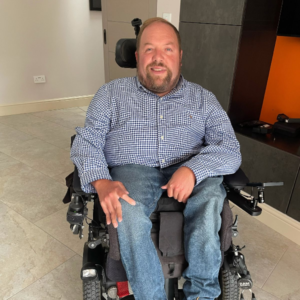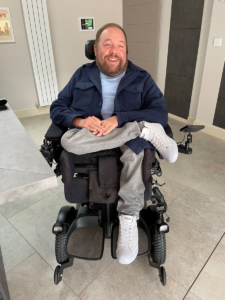Ross – Personal Budgets and Managing a Work / Life Balance
Ross – Personal Budgets and Managing a Work / Life Balance
Ross shares how he increased his personal budget and shifted his work / life balance to be more manageable:
 As I have grown older, I have connected, and / or follow various fellow adults with SMA. Some adults within the community are quite open with their lives and many, for various reasons, aren’t in full-time employment. I remember seeing one fellow SMAer, with three personal assistants (PAs) on holiday, aware that this person has full-time 24/7 care. I looked at the costs and I did the maths; my budget didn’t have that scope.
As I have grown older, I have connected, and / or follow various fellow adults with SMA. Some adults within the community are quite open with their lives and many, for various reasons, aren’t in full-time employment. I remember seeing one fellow SMAer, with three personal assistants (PAs) on holiday, aware that this person has full-time 24/7 care. I looked at the costs and I did the maths; my budget didn’t have that scope.
My personal budget was heavily favoured and maintained by Access to Work and my employer. In the past two years I have had some ill health and I never felt I could take a day off work as it’s my understanding that Access to Work do not allow claims when off work, even if you have sick pay from your employer – and you still need your PAs. Also, following covid times, I have thought about my work life balance, and thought that if I didn’t work, where would my care funds come from, with less Access to Work funding?
Overall, I felt the funding for my care and support was unbalanced.
Having lived 24/7 independent for 8 years I have a meticulous spreadsheet of PA costs. I know what it costs fund my care. But each year NI, Pensions and National Living Wage rise without any increase in my personal budget.
I contacted my networks and shared my situation; others shared their budgets too – or anything SMA related. I gathered vital evidence that I was, on average, £35k per year below others with similar needs.
I rang my Adult Social Care Team and explained in a transparent honest way the situation. It was important for them to hear that working and gaining funds for care only through Access to Work was having a detrimental impact on my independence and well-being. I asked them to address it proactively before a crisis arose.
I was allocated a new social worker who was great and ready to address my concerns and support me.
I also involved my Neuromuscular Care Advisor and my carers – the latter knowing my care and support needs inside out.
My Social Worker and Neuromuscular Advisor shared the Continuing Healthcare Checklist with me, which helped my understanding of how severity of care needs are assessed. The social worker also shared with me what kind of information she would need to be able to complete her assessment.
 Having a business background, I write proposals and documents weekly. I therefore decided to write a business case in support of a funding increase to properly meet my care needs. It had a summary upfront, the data in the middle and the ask at the end. I used the CHC checklist as a guide and went into great detail about my care and support needs – focussing on the bad days, the cold days and the days when I need extra support. I included the finances, the hours worked, and all the challenges related to employing PAs; recruitment, training and maintaining a reliable, supportive team.
Having a business background, I write proposals and documents weekly. I therefore decided to write a business case in support of a funding increase to properly meet my care needs. It had a summary upfront, the data in the middle and the ask at the end. I used the CHC checklist as a guide and went into great detail about my care and support needs – focussing on the bad days, the cold days and the days when I need extra support. I included the finances, the hours worked, and all the challenges related to employing PAs; recruitment, training and maintaining a reliable, supportive team.
I also brought in what having care means to me, what I can do… support myself financially, work, pay my mortgage and afford my home, transport, medicine and add value to society.
I tried to keep the emotion out of it. It was a successful application, taking around 5 months, with much back and forth and clarifying of information, but really worth it to ensure funding that means my life is balanced and fully supported.
My top tips:
- Never give up
- Have integrity and humility
- Challenge professionally
- Gather data/evidence/information
- When asked to provide information be quick
- Explain the issues and your needs fully and clearly
- Present knock-on effects, e.g., carer redundancy costs if they cut funding
- If you can get a job and do, even 16 hours a week and some
- Access to Work funding might make a difference!
